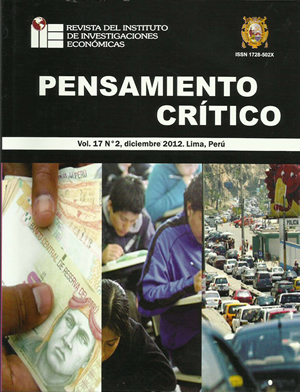La crisis económica del 2012 y los principios generalmente aceptados por la ciencia económica
DOI:
https://doi.org/10.15381/pc.v17i2.8934Keywords:
Economic cycle, Recession, GDP, monetary flexibility, profit rate, Seigniorage, Unemployment, Monetary Policy, Productivity.Abstract
The deepening economic crisis, with devastating social consequences, also reveals the crisis in economics. Obviously not only the bankruptcy of “mainstream” neoclassical or Keynesian, but also unprecedented challenges for those who have continued to practice, in an original way in recent decades, the critique of capitalist political economy. It appears that today, as in any other period of, not infrequently misunderstood relationship between economic status and political category. This article examines the continuity of the economic crisis that began in late 2007, many considered surpassed in early 2011. Briefly exposes the contradictions of the capitalist mode of production, which are formally more noticeable in the financial market, but they are intrinsically related to the so-called real economy, ie productive manufacturing sector. It also highlights a clear crisis in economics, particularly in their schools of thought that have been prevailing in the universities during the past 60 years, since the end of World War II, which have led to campus protests paths of Europe and the United States, particularly in the iconic Harvard University. Analyzing official reports, statistical data of the U.S. economy and European economic data, it is found empirically through quantitative research developed in Switzerland, which applies concepts of chaos theory, a concentration process of global finance capital, on the other hand, is such analysis contrasts with a process of falling wages, increase in productivity and a growing reserve army emerging from massive layoffs and job insecurity worldwide. In contradiction arises in light of the data a period of massive growth in consumption through credit, checking the academic validity of the term “fictitious capital” developed by Marx in Volume III of Capital. Despite a declining rate of profit is developed, contradictory process of capital accumulation that feeds speculative and parasitic field. The article suggests that corrective measures tested so far by the highly industrialized countries lead to a recession inexorable long-term, considering, in its conclusions, a new historical period of great transformation in the collective consciousness and creative action of workers must become if humanity is not to reissue another human barbarity as ending the economic crisis occurred in October 1929: the World War II. Finally, the analysis of the global economy, involves interpreting the dynamics of economic laws within highly industrialized capitalist markets and their interrelationships contradictory, this dynamic set a pattern for the rest of sparsely industrialized economies, such as Perú . Such dependence is not mechanical, and both its internal dynamics, which may lead to development of internal capitalist market, or to establish a greater reliance on primary exports, as its interface with the world market, which can validate the emergence of an emerging economy or the sad reality of a semi-colonial economy, will depend, ultimately, on the evolution of this global crisis.Downloads
Published
Issue
Section
License
Copyright (c) 2012 Abraham Llanos Marcos

This work is licensed under a Creative Commons Attribution-NonCommercial-ShareAlike 4.0 International License.
THE AUTHORS RETAIN THEIR RIGHTS:
a. The authors retain their trademark and patent rights, and also on any process or procedure described in the article.
b. The authors retain the right to share, copy, distribute, execute and publicly communicate the article published in Pensamiento Crítico (for example, place it in an institutional repository or publish it in a book), with recognition of its initial publication in Pensamiento Crítico.
c. The authors retain the right to make a subsequent publication of their work, to use the article or any part of it (for example: a compilation of their works, notes for conferences, thesis, or for a book), provided they indicate the source of publication (authors of the work, journal, volume, number and date).






